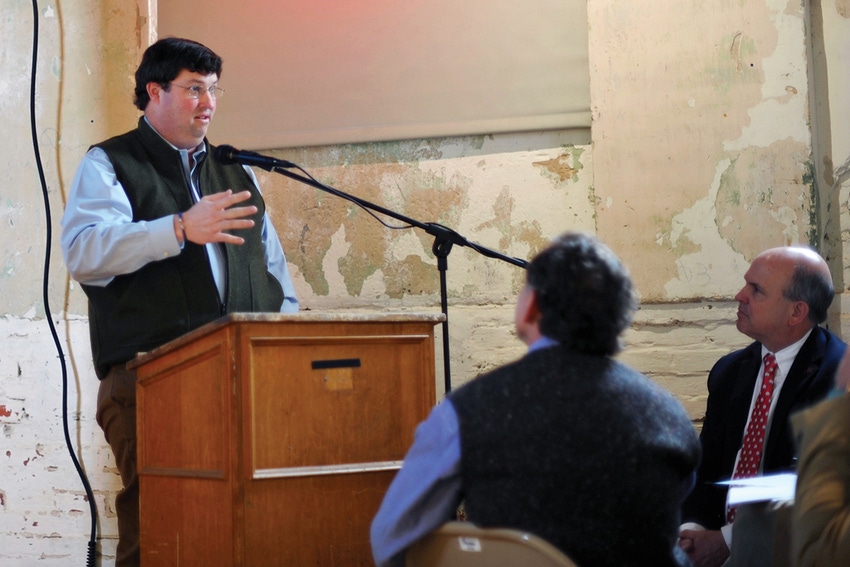March 23, 2016

Hundreds of Mississippi farmers turn to Delta F.A.R.M. each year to make their land more environmentally sustainable. Many of those farmers, as well as industry experts and landowners, attended the organization’s 2016 annual meeting in Indianola, Miss., to learn more about organization’s water conservation and water quality improvement projects.
“Volunteer conservation works, and the work of Delta F.A.R.M. is the jewel of rural America,” says Kurt Readus, state conservationist for USDA’s Natural Resource Conservation Service. “Each program is a tool in the tool box to meet the conservation needs on your farm.”
Among the water conservation and water quality programs discussed at the meeting were the Mississippi Healthy Soils Initiative, the Delta Nutrient Reduction Strategy, and the Rice Stewardship Regional Conservation Partnership Program.
According to Dan Prevost, watershed specialist with Delta F.A.R.M., the Mississippi Healthy Soils Initiative is basically soil management for water conservation. “Our soils have changed a lot through the years. Improving the health of the soils boils down to reducing tillage and utilizing cover crops,” he says. In 2015, 25 cooperating farmers planted 3,728 acres of cover crops under the guidance of the Stoneville, Miss.-based organization. “We provide the cover crop seed to help a group of farmers learn together.”
Rice producer Mike Wagner of Sumner, Miss., says, “With conservation practices, one might not simply sustain his soil, but might enhance his soil’s organic matter levels.” Wagner encourages others to “spend the time and resources to develop your own system that works in your situation to protect the health of your farm.”
Delta F.A.R.M. believes in a pro-active strategy to conserve water and improve the Delta’s water quality by putting conservation programs into practice on Mississippi farms. Delta F.A.R.M. then monitors and evaluates the data to further improve the efficacy of each program. “We’ve learned that structural conservation practices alone probably aren’t enough. We’ve got some more work to do,” says Prevost. “We hope to take care of our own business. Let’s come up with our own solutions so that regulatory measures are not necessary.”
The irrigation water management program, Pipe Planner, also was highlighted at the meeting. In 2015, Delta F.A.R.M. designed more than 30,000 acres of Pipe Planner acreage across the Delta, all at no charge to the landowners. “The Pipe Planner program saves time, saves money, and, most importantly, saves water,” says Tim Huggins, natural resource specialist with Delta F.A.R.M.
Chris Wells, chief of staff for the Mississippi Department of Environmental Quality, adds, “We’ve met the 10 percent deadlines for well meter installation and water usage reporting, and those are significant milestones allowing us to avoid shifting into regulatory mode. But, it is the beginning of a journey. It is the first step. We haven’t reached our destination and we never will.”
Also discussed was a new cooperative agreement with the Natural Resource Conservation Service through which Delta F.A.R.M. experts will assist NRCS staff with program checkouts, and education outreach to producers and landowners. “At NRCS, we try to meet the local need and working with our partners, like Delta F.A.R.M., is the only way that happens. Volunteer conservation practices help us manage lands to increase your resiliency to natural disasters such as hurricane force winds and floods,” Readus says.
“We’ve seen an increase in days without precipitation and that definitely impacts the state’s crop. We may get 50 plus inches a year of rainfall in the Mississippi Delta, but it doesn’t fall when we need it,” he adds. “Organic residue helps us get through those dry times, and if you can increase your soil infiltration by 1 percent, you’ll increase your water savings up to 25,000 gallons per acre.”
Jefferson County, Miss., farmer Mike McCormick, president of Mississippi Farm Bureau, a Delta F.A.R.M. partner, says, “My goal is to leave my farm better than I found it, and I work on that everyday.”
You May Also Like




